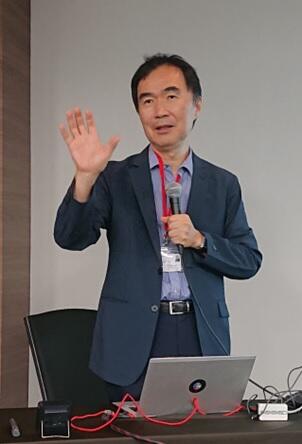Japan's flagship petascale supercomputer 'Fugaku' boasts world-class high performance and will become readily available on Amazon Web Services (AWS). Director Satoshi Matsuoka of the RIKEN Center for Computational Science (R-CCS) introduced Virtual Fugaku at the 'Digital Transformation (DX) Forum on Education and Research' and announced that its beta version would be released as early as November.
Generally, supercomputers maintained in computer centers, such as at universities, have individual development environments. For example, to execute an application for molecular dynamics calculation, it must be customized to the supercomputer there, which by itself is time-consuming and labor-intensive. Moreover, unlike the Windows and Mac OS, user mostly have to execute software by directly typing on the keyboard, which requires specialized knowledge and skill, and is a hurdle for beginners. These factors have contributed to disrupting the integration of diverse disciplines with computational science.

Fugaku is Japan's flagship supercomputer, and a major difference it has from conventional supercomputers is that, in parallel with hardware development, an environment is also provided for users to run basic software and applications optimized for it. Therefore, from the very outset of its operation, it has demonstrated high performance, averaging approximately 70 times higher computational power than the K computer in a wide range of applications, including 131 times in molecular dynamics calculations, 127 times in global environment simulations using observation big data, and 70 times in quantum chemistry calculations.
Users can work with over 100 preinstalled onboard applications, including molecular dynamics, condensed matter physics, computational biology, quantum chemistry, fluid analysis, structure and collision analysis, electromagnetic field analysis, weather and climate, machine learning, bioinformatics, multi-purpose visualization software, mesh manipulation, and statistical analysis and data analysis, as well as various libraries and development environments. Several commercial software programs have been installed, and users can capitalize on them immediately if they purchase a license.
Fugaku allows many of these applications to be run in a GUI environment that allows operations such as drag-and-drop, just like Windows and other operating systems. Instead of coming to RIKEN, you can connect to Fugaku from your workplace and manipulate it in an environment called 'Fugaku on Demand,' through any browser connected to Fugaku online. This system has been successful in supercomputer programming contests conducted for high school students.
Virtual Fugaku is a virtualized and packaged version of Fugaku's operating environment, which can be leveraged with other supercomputers and cloud computing. AWS uses a different CPU than Fugaku and achieves high computational performance, while Fugaku has higher memory performance. It will be available for all supercomputers across the country.
Matsuoka stated, "We ran several applications and found their performance to be similar. As the products of calculations cannot be kept a secret in Fugaku, they could be leveraged by companies and other organizations. Starting with AWS, we would like to generalize Virtual Fugaku in the future to all supercomputers nationwide to create an environment that makes it easier for users to work with supercomputers."
This article has been translated by JST with permission from The Science News Ltd. (https://sci-news.co.jp/). Unauthorized reproduction of the article and photographs is prohibited.




